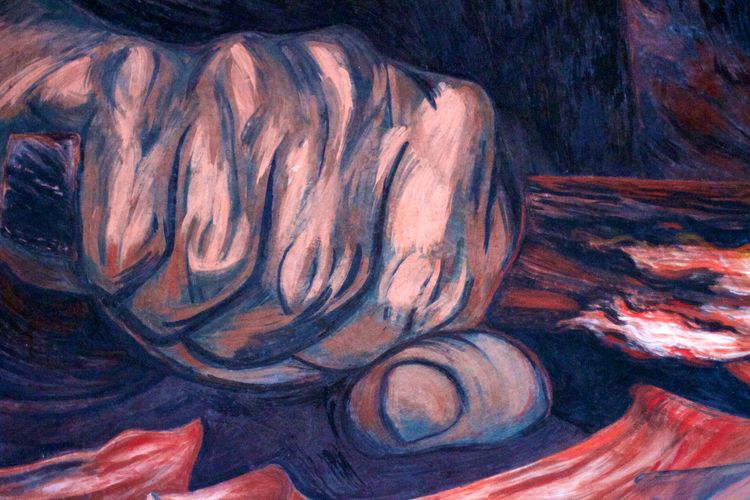What is a “High-Value Man?” | The Ideal Man

“The Ideal Man of the eighteenth century was the Rationalist; of the seventeenth, the Christian Stoic; of the Renaissance, the Free Individual; of the Middle Ages, the Contemplative Saint. And what is our Ideal Man? On what grand and luminous mythological figure does contemporary humanity attempt to model itself? The question is embarrassing. Nobody knows.” ¹ - Aldous Huxley
What is a high-value man? How is high value measured? Does the individual man himself determine it? Or is it determined by others? These questions about what makes a man high-value, in many ways, illustrate the confusion and contradictory thinking we see currently in men’s spaces collectively known as the Manosphere. Despite the abundance of self-help content for men online, there seems to be a lack of focus with men ranging from pickup artists to Ph.D. psychologists.
On one end of the spectrum, there are intellectuals like Jordan Peterson who encourage men to hold themselves accountable and make responsible decisions. In contrast, on the other end, we have social media influencers like Andrew Tate promoting the hustle mentality to men so they can afford to live a lavish, playboy-esque lifestyle like himself. Clearly, influencers within the Manosphere space have mixed views on what constitutes a high-value man and, unfortunately, have thrown the whole concept into total disarray. In one breath, we say high value is determined by a man’s ability to protect and provide, and then, in the next breath, we conclude that high value is based on a man’s wealth and status or how many women he’s slept with. Or what I call qualifiers: external markers that denote a man’s value.
While both examples are not mutually exclusive, there are inconsistencies with this high-value narrative, especially when we consider other male roles, such as fathers or various leadership positions. Moreover, if one happens to achieve this high-value state through unscrupulous means, should we not condemn them? Or, should we instead admire their tenacity and ability to garner such a luxurious lifestyle for themselves regardless of how they did it? After all, it’s difficult for a man to become somebody in a world full of nobodies. Arguably, as long as a man has some degree of high value, we should expect him to have the following qualifiers—fortune, fame, fitness, and females—and not necessarily in that order.
Granted, while these qualifiers can distinguish high-value men from average men, they don’t, in actuality, make them high-value as a result. Rather, they are the results of being high-value in the first place (a distinction I will elaborate on later.) Even so, why do men and women consider someone who has these qualifiers important or, at least, enough to pay attention to? From an evolutionary perspective, having high value, or at least the perception of high value, attracts women. Owning an expensive luxury sports car has been shown to change one’s attractiveness, but only if you’re a man. ² Women prefer men with a good earning capacity, which does not change even in countries with greater gender equality. ³ And two studies have shown that men and women both pay more attention to high-status men than high-status women. ⁴ These few pertinent examples show why having these qualifiers is essential for men—they indicate to women a man’s genetic quality.
Why does this matter? Because ingrained in every human being is an unconscious desire to ensure one’s legacy either by name or birth—by way of one’s contributions to society or their offspring. It’s a poor man’s version of immortality, but it is a way to live on in some capacity despite death. And if not, to take advantage of life’s pleasures while one is still alive. However, the contrast between a high-value man and one who is not is ill-defined in this context. If what determines high value is contingent on externalities, then what makes a man high-value can easily be taken away. A man’s wealth can be lost or stolen from him, his physique and looks can quickly diminish, his fame can either burn out or fade away, and women, even when abundant or scarce, are only as good as those willing to remain loyal to him.
Indeed, these qualifiers apply mostly to men in consumer-driven cultures, but they are, ultimately, superficial. Externalities do not measure someone’s value any more than the lack of them does. And yet, we cannot help but judge a man if he is without. Psychologist Sigmund Freud noted this behavior in his book, “Civilization and Its Discontents,” stating that:
"It is impossible to escape the impression that people commonly use false standards of measurement—that they seek power, success and wealth for themselves and admire them in others, and that they underestimate what is of true value in life." ⁵ - Sigmund Freud
Some might argue that what is considered high value is determined by each man himself, depending on his goals. Because everyone’s version of success differs, high value must be open to interpretation. Moreover, there is a wide variety of high-value men and, as such, may not fit some men’s criteria of what an ideal man should be. It would seem, under this paradigm, that high value is subjective and based upon standards defined by one’s own value system and not on societal expectations. While one might consider the following argument’s premises fair, its conclusions are flawed. Obviously, there are universal, cross-cultural standards for men we consider high-value. It is only when a society is bereft of great men that the qualifiers for what are regarded as high-value drop to the most superficial aspects of success. Jungian psychologist Robert L. Moore observed this as a crisis of mature masculinity, stating that:
“Lacking adequate models of mature men, and lacking the societal cohesion and institutional structures for actualizing ritual process, it's ‘every man for himself.’ And most of us fall by the wayside, with no idea what it was that was the goal of our gender-drive or what went wrong in our strivings. We just know we are anxious, on the verge of feeling impotent, helpless, frustrated, put down, unloved and unappreciated, often ashamed of being masculine. We just know that our creativity was attacked, that our initiative was met with hostility, that we were ignored, belittled, and left holding the empty bag of our lost self-esteem. We cave in to a dog-eat-dog world, trying to keep our work and our relationships afloat, losing energy, or missing the mark.” ⁶ - Robert L. Moore
This “every man for himself” attitude is what is affecting our understanding of what it means to be high value and why, despite the endless resources and information men have to improve themselves, l don’t seem to be evolving and, in some cases, devolving. Men who chase after fortune, fame, and women do so because it makes them feel powerful in contrast to other men, making them feel higher in value. But should these metrics be the qualifiers that decide whether or not a man is high value? To answer this question, we must first answer a more fundamental question: what makes a man a Man?
When one characterizes someone as a Man, they are bestowing said individual a title. While puberty signals that a boy has reached physical maturation, we don’t call such a boy a man simply because he can reproduce, unlike girls. The title of Man has to be earned, and a boy does this by meeting one simple criterion, universal in almost every society that has ever existed, both primitive and advanced. That criterion is that a man must produce more than he consumes. Anthropologist David D. Gilmore wrote about this critical threshold boys must pass to become men, asserting that:
“[Manhood] represents the point at which the boy produces more than he consumes and gives more than he takes. [It] is the social barrier that societies must erect against entropy, human enemies, the forces of nature, time, and all the human weaknesses that endanger group life.” ⁷ - David D. Gilmore
A Man is a producer, first and foremost, whose value is contingent on what he produces for others and how they positively affect society. We expect that as a boy becomes a man, an inversion will occur whereby instead of consuming more than he produces, he will produce more than he consumes. A boy will no longer depend on others but rather have others depend on him. Evidently, boys who do not make this necessary transition into adulthood will remain in an adolescent state and thus will not be bestowed the title of Man. Men who have matured biologically yet remain psychologically infantile by relying on others we regard as moochers or, worse, parasites. In other words, they consume more than they produce. Production value in proportion to one’s consumption level, thus, are the measures of a man and what defines his value. Hence, wealth and status tend to correlate with a man’s production abilities. If a man invents a new product or creates a service that others find useful enough to invest either their money or time in, then he will reap the benefits of his creations.
However, what makes a man high value is determined more by the quality of what a man produces rather than the quantity. What man creates can be helpful to his fellow men or exploitative of them, and those who produce for ill by selling products or services that cause direct harm are not high-value men. Such men include webcam or street pimps, high-profile drug dealers, or other shady business practitioners who take advantage of others for personal gain. While they may have wealth, status, and women, they do not have the admiration or respect of their communities. Moreover, their type of production perpetuates addiction and infantilism among men, keeping them in a boyish state by making them consume more than they produce.
This adds another layer to how we measure high value; men must not only produce more than they consume but also produce men who produce more than they consume, creating a positive feedback loop of men who contribute positively back to their communities. High-value men beget high-value men.
The quality of what a man produces for his community is what determines his value, not the gains he receives as a result of success. Fame, fortune, fitness, and females, as I mentioned previously, are external qualifiers that people often attribute to a man’s high-value status. Still, they say nothing of him other than he owns material possessions and takes pains crafting a specific image for himself. But a man's worth is not determined by what he owns but by what is left after everything has been taken from him. Only when a man has nothing can you learn everything about him. How does he carry himself through struggle? Does he act resentful or content when he is destitute? Does he blame the world for his problems, or does he take full responsibility for his actions? All of these gauge a man’s value—his ability to persist.
In addition, when he has everything, how does he behave? Does he spend his wealth carelessly, or is he frugal? Is he obsessed with prestige, or is he humble despite fame? Does he indulge in the comfort and pleasure of women, or does he place boundaries for himself? In other words—to what degree is he able to resist?Herein lies one of the true determining factors of what makes a man high value—his ability to persist and resist. Stoic philosopher Epictetus elaborates on this distinction between persistence and resistance, observing that:
“There [are] two vices much blacker and more serious than the rest: lack of persistence and lack of self-control. The former means we cannot bear or endure hardships that we have to endure, the latter means that we cannot resist pleasures or other things we ought to resist. Two words…should be taken to heart and obeyed when exerting ourselves for good and restraining ourselves from evil—words that will ensure a blameless and troubled life: persist and resist.” ⁸ - Epictetus
In short, a high-value man is someone who can persist through hardship even when he has nothing and resist temptation even when he has everything. Moreover, he should be a man of both means and principles by adding value to society without exploiting others for his gain. Or as the sociologist Peter Roche de Coppens explains:
“The ideal man is he who lives for others, consciously and systematically subordinating personal thoughts, sentiments, and actions to humanity. He consciously and deliberately realizes higher social instincts and inclinations while, at the same time, inhibiting and suppressing lower instincts and inclinations. He knows what society and history are and consciously works to bring about their fullest unfoldment and realization.” ⁹ - Peter Roche de Coppens
A commonly expressed notion is the distinction between a “good man” and “good at being a man.” Being a good man is essential to direct one’s thoughts and actions. Having a moral framework or foundation is what keeps a man disciplined and regulated, but it is useless to be a good man if one is not good at being a man. To be good at being a man means he must be strong, courageous, and competent so that he can put those thoughts and actions into practice. In other words, a high-value man is a good man who is good at being a man. He is, conclusively, the ideal man. He is the man who produces more than he consumes—who also begets men who do likewise. He is the man who persists through hardship while also resisting temptation. He is the man who is tamed by his moral sentiments and love for humanity but is willing to use violence when necessary. He may have the external qualifiers of high value, but he does not let those superficialities determine his worth. Instead, he lets his actions speak louder than his words and does not rely solely on his manly image. All of these are the highest expression of a high-value man and are what ultimately determine a man’s worth.


